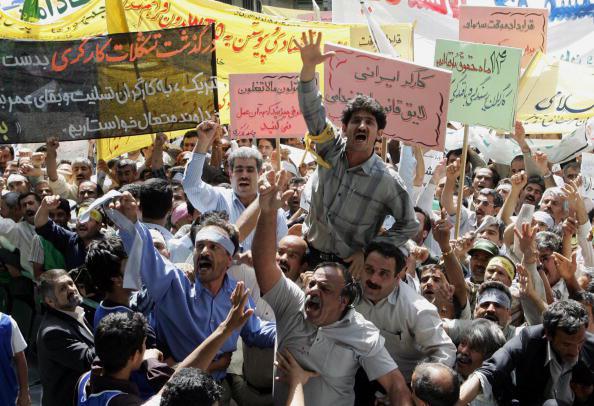HRW – Iranian authorities have increased targeting of teachers and labor activists in recent weeks for organizing and conducting peaceful protests, Human Rights Watch said today.

On November 13, 2018, the Council for Coordination among Teachers Unions organized a walkout involving dozens of teachers across Iran to protest their insufficient salaries due to high inflation and poor living conditions. It was the second teacher-organized walkout since September 21, when Iran’s public school year began.
“Iranian authorities are punishing teachers and labor activists for exercising their collective bargaining rights and conducting peaceful protests that are essential freedoms for all workers,” said Michael Page, deputy Middle East and North Africa director at Human Rights Watch. “Authorities’ recent talk of ‘national unity and resistance against foreign pressure’ are empty words when they throw educators and labor activists in jail for demanding a fair wage.”
The Telegram channel of the Council for Coordination among Teachers Unions reported that the authorities have arrested at least 12 teachers since November 11 and reportedly summoned and interrogated 30 more. The authorities arrested Hashem Khastar, a prominent Teachers Union member in Mashhad, on November 1, after the first walkout, and held him in a psychiatric hospital until November 19, then released him. Three other prominent members of the teacher’s union are also currently behind bars in Iran.
Iran’s recent crackdown on labor activists has extended to the private sector. On November 18, the Telegram channel of the Haft Tappeh Sugar Cane Workers’ Syndicate reported that authorities arrested all members of the association of labor representatives for the Haft Tappeh Sugar Cane company, including two of the group’s prominent leaders, Esmael Bakhshi and Mohsen Armand. On November 20, Mosfata Nazari, the prosecutor of Shoosh County, told reporters that authorities have released 15 labor activists who were arrested during the protests.
Rasoul Bodaghi, a Teachers Union member who spent seven years in prison from 2009 to 2016 for his peaceful activism, told Human Rights Watch that authorities detained Khastar in the hospital without bringing charges. Sadighe Maleki, Khastar’s wife, told the Center for Human Rights in Iran on October 25 that authorities at the hospital requested permission from the Mashhad’s prosecutor’s office before allowing her to visit.
The government has arrested other teachers in similar circumstances over the years. On April 21, during teacher week in Iran, authorities arrested Mohammad Habibi, a Teachers’ Union member, during a peaceful demonstration. Authorities had initially arrested Habibi on March 3 but had released him on bail a few days later. On August 4, Amir Raeesian, Habibi’s lawyer, told ISNA news agency, that branch 26 of Tehran’s revolutionary court, had sentenced Habibi to seven and a half years in prison for “assembly and collusion to act against national security,” to 18 months in prison for “propaganda against the state,” to 18 months in prison and 74 lashes for “disrupting public order,” and to a 2-year ban from membership in political parties and traveling outside the country.
If the court of appeal upholds the sentence, under article 134 of Iran’s penal code, Habibi will serve seven and a half years.
After a peaceful protest in front of Iran’s parliament in May 2015, authorities arrested and prosecuted two prominent members of the Teachers Union. In 2017, authorities arrested Ismael Abdi, the Teachers Union secretary-general, and Mahmoud Beheshti Langeroudi, the union spokesman, who had both been previously released on bail, to serve their sentences.
Abdi had been sentenced to six years in February 2016, on charges of “propaganda against the state” and “assembly and collusion against national security,” partly for a teachers’ demonstration in front of the Parliament. On April 9, 2018, Langroudi’s family told ILNA news agency that a court of appeal had reduced his sentence from 14 years to 5 years. Bodaghi said that Beheshi’s charge also stemmed from planning for the demonstration in front of the parliament.
Bodaghi said that after his conviction, the Education Ministry expelled him from his teaching job. He filed an appeal after he served his sentence, and on May 30, 2018, he was told that he could only receive financial compensation for his tenure.
On November 18, Gholamreza Shariati, the governor of Khuzistan, told IRNA news agency that four people had been arrested during the Haft Tappeh protests. Labor protesters say that conditions at the 50-year old Haft Tappeh Sugar Cane Company have deteriorated since its privatization in 2015. In a video a journalist, Mohmmad Mosaed, published on Twitter on September 1, dozen workers say that they have not been paid for several months.
Iran’s labor law does not recognize the right to create labor unions independent of government-sanctioned groups such as the Islamic Labor Council. Since 2005, authorities have repeatedly harassed, summoned, arrested, convicted, and sentenced workers affiliated with independent trade unions.
Article 22 of the International Covenant on Civil and Political Rights (ICCPR) and article 8 of the International Covenant on Economic, Social, and Cultural Rights (ICESCR) protect the right to form and join labor unions. Iran is a party to both of these treaties. Iran is a member of the International Labour Organization (ILO), but has refused to sign the treaty’s convention 87 on Freedom of Association and the Protection of the Right to Organize and 98 on the Right to Organize and Collective Bargaining.
“The escalating crackdown against teachers and labor activists follows the same old recipe that authorities have pursued for decades,” Page said. “Rather than empowering unions to act as a bridge between authorities and its members, Iranian authorities suppress any effort at peaceful mobilization.”
 Shabtabnews In this dark night, I have lost my way – Arise from a corner, oh you the star of guidance.
Shabtabnews In this dark night, I have lost my way – Arise from a corner, oh you the star of guidance.


